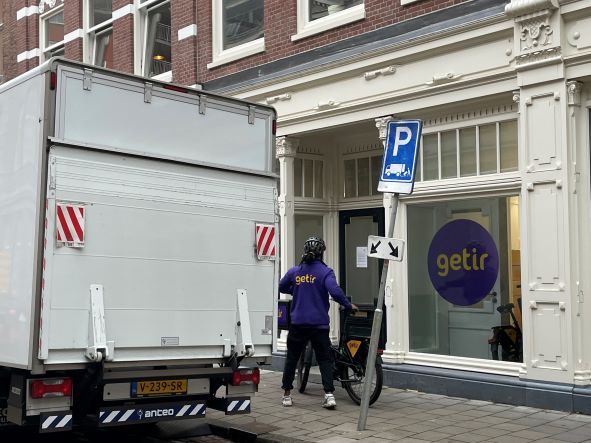Dark stores banned from residential areas in Amsterdam
Senay Boztas
Super-fast delivery firms can only have their warehouses on industrial estates in Amsterdam, after a vote by the city council, reports the Parool.
Last year, after a stream of complaints from local residents, the council proposed limiting the locations for the warehouses – known as ‘dark stores’ as the windows were initially blacked out.
The fast delivery sector grew dramatically during the pandemic, promising to bring everything from nappies to beer direct to people’s doors within minutes. A proliferation of venture-capital funded companies has been vying for market dominance, particularly in the geographically small and heavily-populated Dutch capital.
However, there were thousands of reports of hugely increased nuisance when warehouses to serve the deliveries were situated in residential neighbourhoods. The delivery companies typically work for seven days a week, and neighbours complained about noise nuisance, excess traffic to maintain warehouse stock and pavement space taken up by delivery bicycles and mopeds.
Last year, the Dutch capital made a preliminary ruling to ban new dark stores from opening and cities such as Rotterdam and The Hague followed suit in imposing more restrictions. A series of stores were ordered to close in court cases, Zapp departed the Netherlands while major company Gorillas was taken over by rival Getir.
Amsterdam councillors have now voted that – except in exceptional circumstances – the warehouses will only be permitted on industrial estates due to the associated nuisance. ‘It is fine to earn money, but not at the cost of the city,’ GroenLinks councillor Nienke van Renssen was reported as saying.
City planning chief Reinier van Dantzig said that the city had 2,113 complaints about dark stores in 2022, compared with 661 in 2021.
However the venture-capital funded sector is fighting back. Florian Brunsting, director of Getir and Gorillas, recently told the Parool that being banned from central locations would threaten the entire business. ‘If we have to deliver from the edges of the city, we will be too far from our clients, we can deliver fewer orders per hour and the business model will come under pressure,’ he said.
Getir was in court on Thursday fighting a €20,000 fine and city order to shut a store in De Pijp, which was refitted last year to resemble a normal supermarket. A verdict is expected in six weeks.
Thank you for donating to DutchNews.nl.
We could not provide the Dutch News service, and keep it free of charge, without the generous support of our readers. Your donations allow us to report on issues you tell us matter, and provide you with a summary of the most important Dutch news each day.
Make a donation